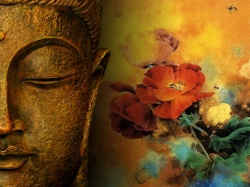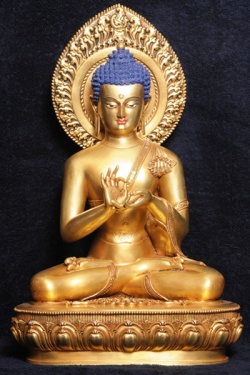The Primal Vow
This wasan is the second time that we encounter a reference to the Primal Vow (hongan, Sk. purva-pranidhana. It is 'primal' because it is fundamental to Amida Buddha's raison d'être; because it is inherent in the 'scheme of things'; because it is the enunciation of wisdom and compassion; because it is the first bodhisattva vow ever made; because it is the 'model' vow; because it arose as a coeval response to the root causes of suffering and bondange to samsara.
The Primal Vow is the natural response to the causes of suffering; it drove Shakyamuni Buddha to seek enlightenment; it moved the gods to plead with him to teach what he had found by returning to suffering humanity; it is the power and motive that caused him to rise up from the enjoyment of his enlightenment and return to the world of anguish for the sake of all beings; it is the reason why we seek religion; it is the impulse and longing that we experience when, after striving for immeasurable æons, we come at last to seek birth in the Pure Land.
The Primal Vow emerges in our consciousness as the Name - Namu-amida-butsu; it furnishes the entrusting in the Name that presages our ultimate enlightenment.
The universe is infinite. It has no beginning and no end; it has infinite dimensions. It has no creator; when the wheel of karma is set in motion, so may its antidote arise. There is nothing but cause-and-effect (Sk. pratitya-samutpada). It is a natural law of being and consciousness.
The specific disclosure of the Primal Vow was made by Shakyamuni Buddha in the Sutra of the Buddha of Immeasurable Life (Larger Sutra). Here, there are forty-eight vows of Amida Buddhah detail the Primal Vow in all its fullness, but the eighteenth Vow is considered to encapsulate the quintessence of these Vows. In order to demonstrate the precise import of the Primal Vow, Shinran Shonin identified five of the forty-eight Vows as essential.
Vow 11: If, when I attain Buddhahood, the humans and devas in my land should not dwell in the stage of the truly settled and necessarily attain nirvana, may I not attain the perfect enlightenment.
Vow 12: If, when I attain Buddhahood, my light should be finite, not illuminating even a hundred thousand kotis of nayutas of Buddha-lands, may I not attain the perfect enlightenment.
Vow 13: If, when I attain Buddhahood, my life should be finite, limited even to a hundred thousand kotis of nayutas of kalpas, may I not attain the perfect enlightenment.
Vow 17: If when I attain Buddhahood, the countless Buddhas throughout the worlds in the ten quarters should not all glorify and praise my name, may I not attain the perfect enlightenment.
Vow 18: If, when I attain Buddhahood, the sentient beings of the ten quarters who, with sincere and entrusting heart, aspire to be born in my land and say my name even ten times, should not be born there, may I not attain the perfect enlightenment. Excluded are those who commit the five grave offences and who slander the right Dharma.)1
Bodhisattva vows are made by all who aspire to become buddhas. The process is The Dasabhumika-vibhasa of Nagarjuna outlines the process. There are ten formal vows and bodhisattvas may add their own special vows. On doing so they awaken bodhicitta, the enlightening mind, leave the state of an ordinary person (bombu) and enter the first stage, the 'stage of joy'. On departing this life they commence an existence that transcends samsara. Their awakening arises from a realisation of the 'equality of all dharmas' - emptiness - an absolute and universal compassion.
Such a selfless awakening for us ordinary beings is unfathomable and its power is unlimited. Before it we can only stand in awe, abandon all our conceit, and entrust ourselves to its embrace.
Namu-amida-butsu

